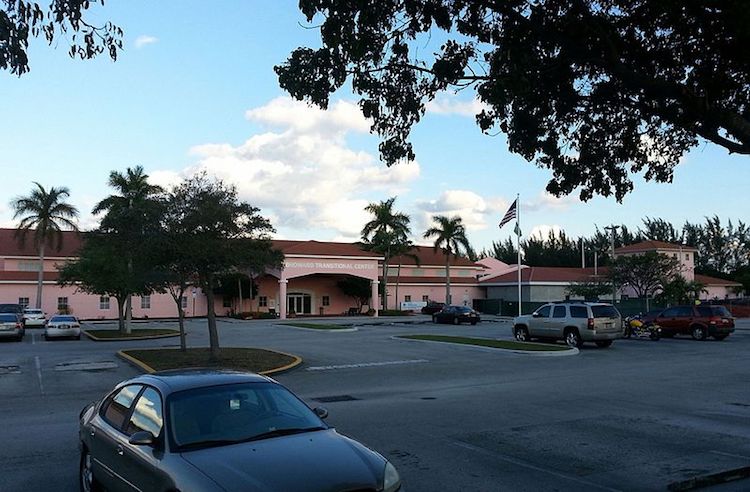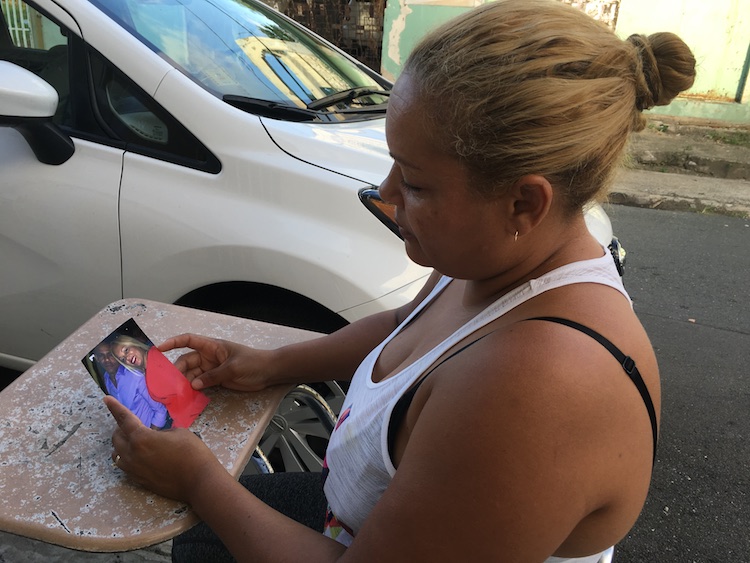Johnny Santana moved to Puerto Rico in the early 1990s in search of a better life than the one he had in his hometown of Higüey in the Dominican Republic.
He worked in construction, as a cook, and later delivering vegetables to restaurants, a job he’s held for the past 20 years. He also found love – married twice – and began to work on his immigration status after he married his first wife.
In the early morning on Independence Day, 2018, as Santana, his brother and three friends, also immigrants from the Dominican Republic, were driving to El Yunque National Forest, officers from the U.S. Immigration and Customs Enforcement (ICE) made a traffic stop and detained three — Santana, his brother and another person — of the five people riding in the car.
Santana was driving with an expired driver’s license.
The next day ICE herded Santana and the other immigrants to the airport — all bound for a flight to Broward Transitional Center (BTC), a 700-bed detention center in South Florida, 1,045 miles away from San Juan, Puerto Rico.

Photo by courtesy of BTC
The Broward Transitional Center (BTC) is a detention center in Pompano Beach, Florida. It is administered by the GEO Group, a private company that has a contract to retain undocumented immigrants classified as “non-criminal and low security detainees”.
After eight weeks in confinement, Santana felt hopeless about his immigration case. He had spent his forty-fourth birthday and the Dominican Republic’s Father’s Day detained. He’d made a decision. On Sept. 4, he appeared in immigration court with his attorney and asked the immigration judge to release him and allow him to return to the Dominican Republic.
Santana missed his wife dearly, but life in detention had become unbearable, he said as he sat outside the courtroom. He later walked into a room to cry in private.
Later that night, Santana expressed his frustration about being detained during a phone interview with the Center for Investigative Journalism (CPI in Spanish) and explained what his decision meant for his wife and their financial future.
“They (ICE) are just trying to make everything difficult,” Santana said about being transferred from Puerto Rico to Florida. “This is not an easy situation to be sitting here without bail and not being able to work.”
President Donald J. Trump changes to the Obama-era immigration enforcement priorities has also affected Puerto Rico, a territory of the United States, and the foreign-born residents with spouses and children, who’ve lived in the island for years, and some even for decades.
Immigration enforcement policies in force during the Obama years established a list of priorities, focused on arresting undocumented immigrants with criminal records and people who posed a threat to national security, according to the American Immigration Council, an immigration policy organization based in Washington, D.C.
The “zero tolerance” approach adopted by the Trump administration compounded with ICE’s decades-long practice of transferring hundreds of thousands of non-citizens across the country, as their cases move through immigration court, is now separating migrant families in Puerto Rico.
Puerto Rico had never been substantially affected by this practice, even after the only detention facility in the island was closed in 2010, six immigration attorneys working on the island said.
CPI interviewed immigration attorneys practicing in Puerto Rico as well as advocates and legal immigration experts from established organizations in the U.S. They all expressed serious concerns about whether many of the non-citizens arrested by ICE since last year needed to be in detention far away from home, especially if they had not committed a violent or serious crime. This practice, they said, violates due process because it prevents immigrants from having access to counsel, present key witnesses and evidence to support their cases in immigration court.
“People who are held in detention away from their families… it takes a psychological toll,” Aaron Reichlin-Melnick, a policy analyst for the American Immigration Council (AIC), a policy organization based in Washington, D.C., told CPI. “It’s harder for them to get evidence and the delays really put pressure on people to withdraw their cases and agree to deportation.”
CPI filed a Freedom of Information Act (FOIA) request to ICE on Aug. 14, 2018 to find out how many apprehensions and transfers of immigrants have occurred in Puerto Rico during the past four years. The federal agency has not provided the data CPI requested.
Puerto Rico seems to be following the trend seen in the rest of the country in terms of ICE’s aggressive apprehensions and transfers, but “the problem is accentuated because you don’t have any detention facility in Puerto Rico,” said Susan Long, a statistician and professor at Syracuse University’s Whitman School of Management and co-director of the Transactional Records Access Clearinghouse (TRAC), a nonpartisan, nonprofit data research center based at that institution.
Trump’s hardline stance on immigrants, whom he has labeled “criminals” and “rapists,” ignores a disturbing reality: more than half of detainees (58 percent) in ICE custody as of June 30, 2018 have no criminal record and four out of five have at most committed minor offenses, such as traffic violation, TRAC data shows.
“Everybody is a target now,” said Rosaura González Rucci, an immigration attorney who practices in Puerto Rico, as she talked about a case where a long-time resident was arrested and transferred from the island to Krome Service Processing Center in Miami. “It doesn’t matter how long they have lived here, it doesn’t matter whether he’s a criminal or not. If you are an illegal immigrant, you are a target, you are a priority.”
Under both U.S. and international human rights law, detained immigrants have a right to be represented in deportation hearings by an attorney of their choice and present evidence to defend their cases.
Attorneys like Elle Díaz Fina, who practices law in Puerto Rico, said the transfer of her clients from the island to places like Florida has created obstacles as she tries to offer the best legal representation.
“For a bond hearing here in Puerto Rico, I can bring many character witnesses, the parents, relatives, bosses and people at work,” Díaz Fina said. “But I can’t do that if the bond hearing is in Miami. First, I need to ask for permission to allow them to be present during the hearing, and second, they don’t have the money to pay for the airfare.”
A shift of enforcement philosophy
Five days after Trump’s inauguration, he signed an executive order expanding the scope of ICE enforcement priorities from the Obama-era, which focused on removing undocumented immigrants with criminal records.
Trump had made immigration the centerpiece of his presidential campaign.
This broadening of scope meant that “all undocumented immigrants have become targets even if they have lived in the U.S. for many years, have U.S.-born children and have never had a run-in with law enforcement,” according to the AIC.
The crackdown on foreign-born residents has resulted in a substantial increase in arrests by ICE and local law enforcement across the US.
Between Jan. 25, 2017 – five days after Trump was inaugurated as president – and Sept. 30, 2017, the end of the fiscal year, ICE made 110,568 arrests, a 42 percent increase over 77,806 arrests made during the same period in 2016, ICE statistics show. CPI filed another FOIA request to obtain segregated data pertaining to Puerto Rico because the island is part of the ICE’s Florida region. The federal agency has not responded to that request.
ICE has aggressively moved to arrest undocumented immigrants anywhere and everywhere. In fact, one-quarter of arrests have been made at homes, places of work, and elsewhere, including at courthouses and the Department of Homeland Security offices when non-citizens had appeared to keep appointments, TRAC data shows.
Whereas in the past, court immigration cases have mostly involved recent arrivals, recent TRAC data shows a shift: 43 percent of cases filed in March 2018 involved people who have been here for more than two years.
Puerto Rico follows a similar trend: 41 percent of cases documented by TRAC data as of August 2018 involved non-citizens who have been in the U.S. over two years.
That’s the case of Martín Romero, a native of Peru.
On Aug. 16, 2018, Maria Ayala, his wife, appeared with her attorney at the U.S. Citizenship and Immigration Services offices in San Patricio Office Center in Guaynabo to re-open her husband’s immigration case that began over two decades ago after Romero arrived in California and requested political asylum.
Ayala and Romero are not their real names, as they have requested to remain anonymous.
“The guy (at immigration) told me that he accepted (to re-open) the case because there was enough evidence that this was a solid marriage,” Ayala said.
After the meeting, Ayala, 41, tried to reach out to her husband by phone, but he didn’t answer.
She was driving home when Romero called and told her that ICE officers had shown up at the restaurant where he worked and arrested him.
“When something like this happens, you can’t remember every detail,” Ayala said, almost crying. “I just lost it.”
The next day, Romero, 51, was put on a plane to South Florida’s Broward Transitional Center.
Ayala and Romero met on the Internet over two decades ago. After years of dating, they tied the knot in Puerto Rico where Ayala was born and raised. Romero worked hard, raised a family and paid taxes, she said.
The couple have gone through several attorneys over the years in their attempts to clear his immigration status.
But many of these cases are complex.
Romero came to the United States with his first wife in 1991.
“He (Romero) fears that he and his family will be killed by terrorists of the Sendero Luminoso because he worked as an undercover agent for the Peruvian Navy at a time when he arrested many members of the Sendero Luminoso,” Romero asylum application dated Jan. 9, 1993 shows.
Romero wrote in his asylum application, filed with the then Immigration and Naturalization Service (INS), that the Sendero Luminoso, a terrorist organization that employed guerrilla tactics in Peru in the 1980s, made dozens of death threats to him and his family.
Romero feared for his life.
In 1995, INS denied Romero’s asylum, noting: “You have not established that your fears are objectively well-founded because there appears to be no reasonable possibility of you suffering persecution in your country,” according to a government document.
Romero appealed his case. Meanwhile, he and his first wife split. Subsequently, the INS presumably sent him a notice to appear, which Romero says he never received. On Jan. 3, 1996, the court ordered his deportation in ‘absentia.’
María del Rosario García Miranda, an attorney who practices law in Puerto Rico, represents Romero.
“This is a family man,” she said. “Just cite him to appear in court and give him the opportunity to open the case, but if you (immigration) don’t allow him to do this, and take him away, you are denying him due process.”
But after Trump’s crackdown on immigrants, Romero became a target because he had an order of deportation dating back to 1996, García Miranda said.
Ayala has the support of her close-knit family. They have continued with their lives at the house in the mountains of Guaynabo. Ayala said the couple has always been honest with their children, ages 14 and 16, about Romero’s immigration status. He’s never been away from his family in 17 years.
“The first days were the most difficult,” she said.
Her mother and one of her brothers sat at the dining-room table quietly listening as CPI interviewed Ayala. At times, her mother would add a comment to punctuate her daughter’s feelings: “Eso no tiene perdón de Dios (That’s unforgivable).”
An ocean between families
The separation of families causes emotional distress, but also financial hardship. This is especially true when the detainee is the sole provider because he’s leaving his family behind scrambling to pay the bills, attorney’s fees, and to send money to pay for phone calls and purchase items at the detention center’s commissary.
Since her husband was arrested, Ayala has exhausted all her savings – $26,000 – paying legal costs, bills and sending money to her husband.
On Oct. 16, Romero was deported to Peru.
The family’s financial situation is so dire that Ayala had sold some household items to make ends meet. She might lose her car and she’s looking for a job in an island where jobs are scarce. Romero is struggling to adjust in a country he no longer knows and where is hard for people older than 50 to find jobs, she said.
“This has not been easy,” she said on the phone, her voice breaking.
The only comfort for now is that Ayala and her children can see Romero’s face when he calls from Peru.
Trump’s immigration policy is contributing to a growing backlog in immigration courts across the country. As of July 31, 2018, pending cases in immigration courts in the US have reached to 746,049 cases, a 38-percent increase comparing to the 542,411 cases pending at the end of January 2017 when Trump took office, TRAC data shows.
Pending cases in the Florida region that includes Puerto Rico, grew by 57 percent from the 2017 fiscal year.
Reichlin-Melnick, of the American Immigration Council, said the immigration court backlog has been growing with every administration, but under the Trump administration, the court backlog is growing faster than at any other time. “If it continues to grow at the same rate, it would double during his first term, which it will be more than any other president’s first term in history,” he said.
A heartbreaking decision
Johnny Santana’s history with immigration court began in 2000 after the government declared his marriage to his first wife to be fraudulent. While Santana’s attorney tried to solve the issue, the government brought back the “marriage fraud accusation” after Santana remarried and his new wife filed a petition with immigration.
The immigration judge in Florida accepted Santana’s letter explaining how the DHS disregarded efforts to prove the claims were wrong. Santana, who has no criminal record, was granted his request and ordered to leave the country, leaving his wife Audri Román behind.

Photo by Mc Nelly Torres
Audri Román in front of her house in Barrio Obrero, Santurce, looks a photo where she and her husband Johnny Santana appear together.
“This is a tough job,” said María del Rosario García Miranda, his attorney with tears in her eyes. “It drains you emotionally.”
A week later, Audri Román, 43, sat on the sidewalk in front of her modest apartment in Barrio Obrero. Román, a U.S. citizen, cares for a bedridden elderly woman and clean houses to make ends meet. Also from Higüey, she met Santana in Puerto Rico years ago and they married in 2013.
She’s optimistic that she will be able to bring her husband back home in the future now that the marriage fraud issue seems to have been resolved. But that could take years.
“The worst of this (situation) is to be forced to leave the life you built here behind,” Román said about her husband.



